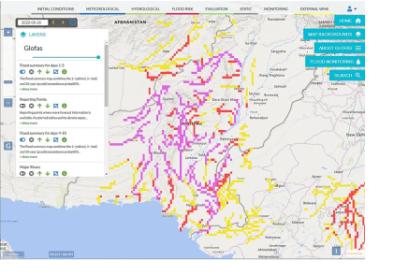Floods, triggered by intense rainfall, affect many communities worldwide. The extremely large floods in Pakistan in 2022, as well as other very large floods in Nigeria, Mozambique, and other countries, impacted many communities, affected their livelihoods, and triggered major losses. According to the Intergovernmental Panel on Climate Change (IPCC), climate change will lead to increased precipitation in many regions, worsening the impacts of floods triggered by such precipitation. Ways in which communities lessen the impact of floods include the implementation of flood risk reduction measures such as land-use ordinances minimizing the exposure of vulnerable elements including infrastructure to floods, and the routine operation of flood early warning systems.
To contribute to improve flood early warning systems, the European Commission and the European Centre for Medium-Range Weather Forecasts (ECMWF) launched the Global Flood Awareness System (GloFAS) in the Spring of 2018. GloFAS produces daily flood forecasts based on the use of hydrological models that benefit from satellite observations of rainfall for state-of-the-art weather forecasts. More information on GloFAS is available here.
Since 2020, UN-SPIDER has joined forces with GloFAS, Airbus Defence and Space, the Centre for Remote Sensing of Land Surfaces (ZFL) of the University of Bonn; and national space agencies, disaster management agencies and other partners in Ghana, Guatemala, Nigeria, Peru, and South Africa to incorporate the routine use of Glofas in flood early warning systems in these countries. More information on this project is available here.
On 26 July 2023, version 4.0 or the Global Flood Awareness System was launched. This new version has a higher spatial resolution of 0.05 degrees (roughly 5 kilometres), includes major improvements to the LISFLOOD hydrological model that allows for improved hydrological model calibration, and new return-period thresholds and water/soil moisture anomaly maps. As a result, it improves the functionality of GloFAS. More information on this new version of GloFAS is available here.

